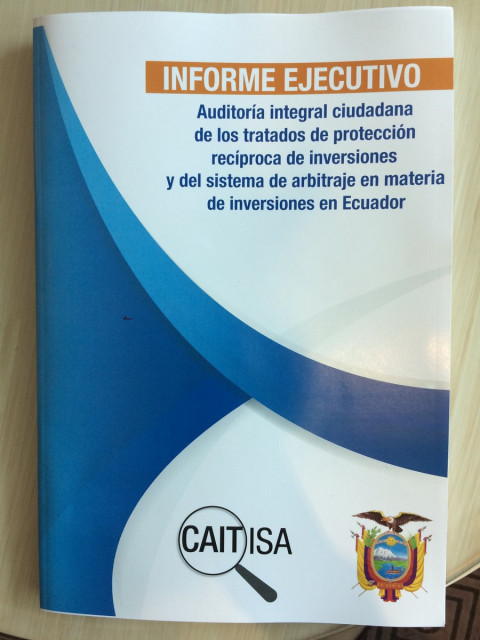Audit Commission President praises Ecuador’s termination of treaties
Regions
The Ecuadorian government announced yesterday that it will complete the process to terminate its remaining 16 Bilateral Investment Treaties. This decision is based on the recommendation of the audit commission’s 668 page report (In Spanish).

Inform ejecutivo
(Amsterdam/Quito, 9 May 2017) The Ecuadorian government announced yesterday that it will complete the process to terminate its remaining 16 Bilateral Investment Treaties. This decision is based on the recommendation of the audit commission’s 668 page report.
Cecilia Olivet, President of the Ecuadorian Citizens’ Commission for a Comprehensive Audit of Investment Protection Treaties and of the International Arbitration System on Investments (CAITISA) said:
“Ecuador’s decision to terminate its investment protection treaties is rational and just. It is based on the insurmountable evidence our commission collected on the benefits and costs of these investment protection agreements. Our report revealed that these agreement have not only failed to deliver promised investment, they have cost Ecuadorians billions of dollars and posed a serious threat to Ecuador’s capacity to regulate corporate activities in order to protect its citizens.”
“Fortunately Ecuador is not alone in denouncing these unjust investment agreements. It is joining a wave of countries around the world calling for a new international legal framework for investment which prioritises public interest over corporate profits.”
CAITISA’s report was publicly launched on Monday 8 May by Cecilia Olivet and other members of the Commission. The 12-person commission was set up in October 2013 and was comprised of government officials, academics, lawyers and civil society groups, including the foremost expert on investment law, Muthucumaraswamy Sornarajah and the former Attorney General for Argentina, Osvaldo Guglielmino.
NOTES FOR EDITORS
1. Cecilia Olivet will be available for interview (in English and Spanish)
2. Contact details:
Interviewee: Cecilia Olivet ceciliaolivet@tni.org
Press support (Spanish/English) - Nick Buxton nick@tni.org; (English) Denis Burke d.burke@tni.org
KEY FINDINGS FROM THE AUDIT COMMISSION ON ECUADOR’S BITS
1.The Bilateral Investment Treaties (BITS) signed by Ecuador failed to deliver promised foreign direct investment:
-
Ecuador, which has more BITS than many countries in the region, only received 0.79% of global FDI that flowed to Latin America and the Caribbean
-
The principal sources of FDI flows into Ecuador are from Brazil, Mexico and Panama, none of whcih have a BIT with Ecuador
-
Of the 7 largest foreign investors in Ecuador, only 23% come from a country which has a BIT signed with Ecuador.
2. Ecuador’s BITS contradict and undermine the development objectives laid out in the the country’s constitution and its National Plan for WellBeing (Buen Vivir). The Ecuadorian constitution of 2008 in its articles 3, 276, 277, 283, 284, 313-318, 339, 222 requires the state to regulate foreign investment to ensure it plays a positive role in achieving the country’s Wellbeing Plan. However, BITS include clauses that erode these state competences.
3.While promises of investment and development have failed to materialise, the costs for Ecuador have been immense with investors disproportionately benefiting in cases against Ecuador::
-
Ecuador has faced 26 cases in international tribunals based on the Bilateral Investment Treaties
-
In 2014, Ecuador was fifth in the world in terms of investment protection arbitration cases; today it is in tenth place
-
In the 15 cases where the tribunal has made judgements, the investor has been favoured in 13 cases (87%) and the state only twice.
4. A total of $21.2 billion dollars has been demanded as compensation from Ecuador by corporations for supposed violation of investment protection agreements.
5. The total amount disbursed so far by the state has been $1.498 billion dollars, equivalent to 31% of education spending or 62% of health spending.
6. Of the cases that are currently open, the State runs the risk of having to disburse 13.4 billion USD. This is equivalent to 52% of the General State Budget for 2017.
SUMMARY OF KEY RECOMMENDATIONS
A- Termination of all bilateral investment treaties
B- Negotiation of new instruments between the State and Investors such as:
a) international investment contracts with restricted rights and investor’s obligations
b) Investment treaties based on an alternative investment model. The Commission has made the recommendation to:
- highly restrict the definition of investment
- exclude certain rights for investors commonly found in investment treaties such as: FET, indirect expropiation, national treatment, most favoured nation, umbrela clause, survival clause.
- a list of rights for the State that would be included, such as: rights of the State to impose obligations to foreign investors, apply performance requirements, impose taxes, secure technology transfer, force investors to respect human rights, among others.
- key obligations for the investor, such as: respect for national and internacional human and social righs, contribute towards national development according to pre-determined criteria, among others.
C- Regarding the international investment arbitration system
- Exclude investor-state dispute settlement mechanism from any future treaty
- provide legal security to investors in national courts
D- Develop a comprehensive national policy and specific rules for foreign investment.
E- Consolidate the powers and the institutional governance of foreign investment in one agency


